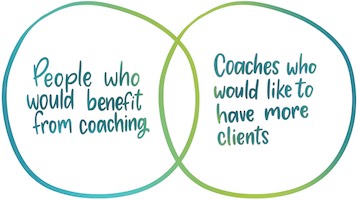Subscribe and receive our best coaching resources
An organizational psychologist, lawyer and mediator, originally from Germany, I have been living and working in Palo Alto, California for 16 years. In the heart of Silicon Valley, I founded the Palo Alto Institute for Systemic Coaching in 2011. The institute is the “home” of three Solution-Focused Brief Coaching approaches, two of which I developed myself.
My true passion is helping clients from different walks of life to deal successfully with stress, blocks, and self-sabotage and to increase their overall wellbeing in a single or very few coaching sessions – exactly the kind of efficient support I would want for myself in a similar situation.
I’m convinced that life is way too short to do the same things over and over again, hoping they turn out differently this time.
Therefore I take great pride in helping executives, artists and athletes to achieve peak performance by using their mind to work in their best interest.
My unique, Brief Brain-Based approaches form the basis of coaching for top performers.
In my experience, quantity or a certain number of coaching sessions, does not necessarily equal quality.
Very often, less is more.
You can find more about my educational and professional background here.
THE GAP BETWEEN WHAT COACHING TYPICALLY OFFERS AND WHAT PEOPLE REALLY NEED
A conversation with Sylvia Kurpanek, Founder of the Brief Coaching method LIMBIC COACHING.
Sylvia, how did you get into coaching and what prompted you to go beyond traditional coaching approaches?
I was introduced to coaching in 2005 as part of my master’s degree in Organizational Psychology and my degree in Mediation (that I, like many other lawyers, had decided to add to my repertoire).
What I found interesting right from the start was that classical coaching is mainly designed to help clients – often high performers – develop leadership and/or other skills, fulfill their potential or achieve transformational change.
Classic coaching approaches therefore focus on long-term goals and require an ongoing engagement of six to twelve months.
I couldn’t help but wonder: Are people really willing to invest that much time until they see results, particularly when the coaching is on their own dime?
With my thinking shaped by my life and work in Silicon Valley, where people enjoy abundance but are severely pressed for time, two additional questions presented themselves:
- Shouldn’t coaching be able to provide faster results?
- And aren’t there totally different contexts in which this type of support can really be useful?
Simply put: While these traditional coaching approaches definitely serve very important purposes and have already helped many accomplish their goals, in my view, they clearly don’t cover all areas in which people want and need support.
That got me to thinking. How can we, as coaches, better support clients by providing sustainable results through 1) shorter engagements, and in 2) additional areas of application – thus making coaching a form of support feasible for even more people.
Where do you see additional areas of application for coaching?
Something I’ve noticed in my personal and professional environments: Most people, when faced with a challenge, or feeling like they’re at the end of their rope, believe they must get through things on their own, or perhaps with help from friends, family or a mentor.
And if what they do works, if the challenge disippates or they overcome stagnation, all is well.
When what they do doesn‘t provide a desirable result, however, many people tend to get stuck in an endless cycle of unhelpful attempts to resolve their issue.
They neither advance nor feel any better.
Given the positioning of coaching I described earlier it’s not surprising that most people don’t even have this service on their radar as an option to help them better deal with a challenge or whatever is bothering them.
Often, people who have heard of coaching erroneously assume it requires the sharing of personal details (as happens in therapy, from which coaching is eager to distinguish itself). And understandably, many dislike talking about their challenge; this too can inhibit them against working with a coach.
And to most, an engagement of six to twelve months would hardly seem to be a proportionate investment of their time and finances to handle something that is bothering them right now.
That’s why my mission is to establish coaching in a new form: Brief Coaching, that provides long-term results in 1-5 sessions by helping clients effectively address their current challenge without them having to share information about it if they don’t want to.
Just as most people’s natural way of dealing with a toothache is to see their dentist, my goal is for people to schedule a session with a coach when they realize they are stuck or else feel the obstacle they are facing is too high to jump over.
I really want for more people to simply find prompt and sustainable remedies to their challenges, blocks, self-sabotage, and stagnations – exactly what I have benefited from myself on several occasions in my life.
The concept of Brief Coaching as “a shorter engagement for more sustainable results” somehow sounds like a contradiction. How does it work?
A: The idea that resolving a “huge” problem requires a proportionately huge effort seems to be deeply ingrained in our thinking. That’s why, to many, medication has to taste bitter in order to work.
But in coaching this doesn’t necessarily hold true. In my experience, the key to long-term results lies in addressing the truly relevant components of an issue, right where they originate – in the client’s emotional brain.
That’s why, to me, a short engagement is in no way counterintuitive to achieving profound and lasting results. On the contrary: often, less is more.

THE EIGHT COURSE MENU AND THE GOURMET SANDWICH
What exactly can clients expect from Brief Coaching?
I like to compare traditional coaching with an eight-course meal accompanied by matching wines. It’s a special treat. It takes time, it is cost intensive, and it is definitely worth it.
But sometimes, when hungry, all you need and want is a gourmet sandwich with artisan ingredients, a salad and a smoothie – something that provides excellent quality, is nourishing and affordable. Something that is served fast and meets your needs – right then and there.
That’s exactly what Solution Focused Brief Coaching offers to clients when life throws them a curveball in the form of a setback, conflict, or other type of difficulty.
And if you have already handled a challenge well with the right support you are, in my experience, definitely better equipped to face similar situations in the future.
That’s why I think that just as outstanding chefs can apply their skills to prepare an excellent one course meal (or a gourmet sandwich), we coaches should also be able to adapt our expertise and, if needed, employ it in Brief Coaching engagements.
What are some examples of how Brief Coaching can help clients?
Here’s a typical example. A client was facing a very important job interview. But, anxious, and lacking his customary self-confidence, he simply wasn’t feeling on top of things. In just two sessions, we identified what was blocking him and addressed it, successfully getting him over the hump.
Another client had creatively avoided flying for years but now definitely needed to get on a plane for an important business meeting. In two sessions, we identified and addressed what had kept him from feeling okay aboard a planeup until now. As a result, he was able to get on that plane and experienced what he called “an almost comfortable flight.”He’s flown many times since and is now fine with it.
Another typical example is a scientist who had received mixed reviews from peers on a research paper and decided not to publish it at all. He was about to discard the paper, thinking “if they don’t get it, then they don’t deserve it”. But, not being fully happy with the situation, he came to see me. In just one session, we identified what had actually prompted his response and addressed it head-on. This totally changed his perspective on the whole issue, and he ended up revising the paper. Some months later, he notified me that in its final version, the paper received pretty good reviews.
By now, it shouldn’t come as a surprise that, for a variety of issues, I really prefer Brief Coaching.
So then, would you recommend that coaching in general should focus much more on brief engagements rather than on long-term support?
Here’s something I’ve come across again and again in my personal and professional environment. This image explains it well:

Most people in the left circle would never even consider “traditional” coaching to tackle their issue, presumably thinking “if addressing this issue in coaching means having sessions over the course of three to twelve months, well, the problem actually is no longer that bad after all …”
And I certainly can’t blame them.
Many coaches depicted in the right circle are, understandably, drawn to the financial security that comes with long-term engagements.
But I would really like to see both circles overlap more – and hence for more people to get custom-tailored support by working with a coach.
That’s why I truly believe it’s worthwhile for us coaches to expand our “menus” by offering Brief Coaching as a complement to traditional coaching. In my view, this would allow us to meet even more potential clients exactly where they are and provide just the right amount of support.
Of course, there are and always will be conditions and goals that can best be accomplished in a long-term coaching engagement.
And in many cases, a shorter and very outcome-oriented approach meets a client’s needs and wants even better.
How are the Brief Coaching techniques different from those applied in traditional approaches?
Once I had discovered the demand for short-term support, I realized that in order for coaches to meet these needs and provide pinpoint solutions, they require different skills than in traditional coaching, where they work more from the cognitive perspective.
I grasped that in order to provide really sustainable results, Brief Coaching needs to include our limbic system, the area of our brain where blocks, stress, and involuntary responses originate.
Very curious and eager to learn about what is out there in the coaching and organizational psychology world, I came across some approaches that systematically include the emotional brain.
What inspired you to develop your methods?
Over the years, I have been trained in a variety of coaching and therapy approaches in the U.S., Canada, and Europe. This prompted me to investigate what exactly facilitates superior results in each of the approaches – and which component best complements another one.
So I experimented a lot with different methods, constantly applying different concepts with my clients. By refining and combining what had turned out to be the most powerful components, I created the LIMBIC COACHING approach and the TRULY SLIM method.
To make things complete, I also work with SYSTEMIC COACHING CONSTELLATIONS, which is an amazing methodology in itself.
Can you explain a bit more about the methods?
The two approaches I developed myself, LIMBIC COACHING and TRULY SLIM, are a unique combination of the best methods I learned from phenomenal teachers over many years.
Both the LIMBIC COACHING method and the TRULY SLIM approach are special in that they help clients tackle their issues from a different angle that is totally in accordance with their emotional brain’s particular requirements.
LIMBIC COACHING is very effective at helping clients to address blocks and challenges, increase creativity and overall well-being, as well as to accomplish peak performance. It can easily be combined with a variety of other coaching approaches.
The TRULY SLIM program provides systematic and brain based support for sustainable weight management.
SYSTEMIC COACHING CONSTELLATIONS is a powerful approach I’ve been studying for 10 years with wonderful teachers from Germany in Munich, Piran (Slovenia) and Abano (Italy). It goes way beyond what many people know as “family constellations” and focuses on solutions.
This is fascinating. What motivates you to share your findings and your methods with colleagues?
I’m passionate about teaching LIMBIC COACHING, TRULY SLIM and SYSTEMIC COACHING CONSTELLATIONS to other coaches, therapists, organizational development experts, and sport psychologists.
Sharing my knowledge and practical experience with my training participants is one of my biggest sources of joy.
In my view, supervision and ongoing support are mandatory for high quality education, and I truly enjoy engaging in both.
Hearing participants’ stories about how they have been able to integrate what they have learned in our courses to help their clients overcome obstacles in a single or very few sessions continues to amaze and move me.
And it’s a huge pleasure to see colleagues being able to choose from more brain-based methods and accomplish impactful results with clients, truly meeting their unique needs.
What do you do when you are not coaching clients or teaching courses for colleagues?
I’m happily married and simply love living and working in multicultural Silicon Valley where innovation and entrepreneurship are omnipresent. A large circle of international friends and the (almost) constant sunshine are great sources of joie de vivre.
In my spare time I like to read (particularly detective novels and books on Psychology and Coaching), watch movies (independent and European movies), run and swim. I consider myself fortunate, because I can travel internationally for work and always meet wonderful colleagues in my certification trainings. No doubt – I have the best job in the world.
Thanks so much for this conversation!
